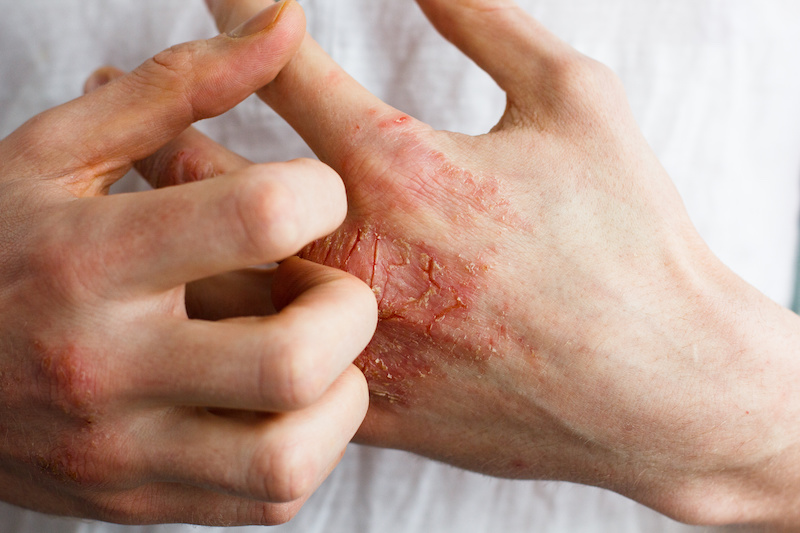Eczema, also known as atopic dermatitis, is a common chronic skin condition that affects children and adults alike and can significantly affect quality of life. Despite being common, eczema is incredibly complex and can involve many different aspects of health. Triggers for eczema can be internal (such as food) or external (such as perfumes or workplace chemicals) or can be due to other factors like stress, gut problems, or poor immune function.
This blog provides you with some information on the condition and what may be contributing to your health picture, as well as providing you with dietary and lifestyle strategies to help you manage your symptoms and return to good health.
What is Eczema?
Eczema is a chronic skin condition that is due to an allergic-type immune reaction in the skin. It is often first diagnosed in childhood but can also develop for the first time in adulthood. For many (but not all) people, eczema occurs alongside other allergic-type conditions, such as asthma and hay fever, but the triggers for each may vary, and you may not experience them all at the same time. In adults, eczema typically presents as patches of dry, scaly skin that can also be thick and leathery.
The key aspect to the development of eczema is a tendency towards an allergic reaction (known as a type 1 hypersensitivity reaction) towards certain triggers (see below). This immune reaction causes immune cells to gather under the skin and mount a response to the trigger, releasing chemicals such as histamine and causing inflammation. This reaction leads to skin damage and physical changes in the skin like scaling, flaking, and itchiness. Over time, the skin’s barrier becomes damaged, as the immune cells cause changes to the fats and proteins in the skin. This damage means less protection from common irritants like soaps, rough fabrics, and heat, and a higher risk of infection.
Triggers for eczema can include:
- Foods – common trigger foods include wheat, cow’s milk, soy, eggs, shellfish, nuts, and peanuts. Food additives, amines, and salicylates can also trigger eczema symptoms.
- Environmental allergens, such as mould, dust mites, pollen, pet fur, cockroaches, and cigarette smoke
- Soaps and detergents, including handwash, dishwashing liquid, shampoos, laundry detergents. Excessive hand washing can dry skin out and make it more prone to a reaction
- Cosmetics, perfumes, and products with added fragrance
- Certain materials, such as wool, synthetic fabrics, or latex
- Changes to the climate, such as temperature changes, or when the air becomes very dry
- Stress
- Sweat
- Dry skin can be more prone to reacting to triggers.

Why do some people react to these things while others don’t? It is because underlying causes are at play, such as a poorly functioning immune system, or chronic and ongoing stress. Underlying causes of eczema include:
- Genetics – some families have a higher tendency to suffer with issues such as allergies, eczema, hay fever and asthma
- Diet – certain foods can be the underlying cause (e.g. due to a food allergy or coeliac disease damaging the gut lining), or they can exacerbate existing eczema, like above
- Gut dysfunction – the gut is important for immune regulation and protecting the body from particles in our food that we might react to. Imbalances in gut bacteria and damage to the intestinal wall can both contribute to eczema symptoms, by allowing undigested proteins and other immune-reactive food particles to be absorbed into the blood.
- Low stomach acid production – needed for breaking down proteins in food that can cause immune reactions. Low stomach acid can also lead to issues such as constipation, which can affect gut health, too.
- Stress – suppresses our immune function and can cause negative changes to gut bacteria, too
- Immune system dysfunction – eczema is an immune-mediated condition. If the immune system is not functioning optimally, it can be impossible for the body to get symptoms such as eczema under control
- Poor elimination function – the skin forms part of the body’s Channels of Elimination. If other channels (such as the kidneys, liver, or bowels) are not working well, the skin can become over-burdened.
Other factors that can play a role in eczema:
- Blood sugar imbalances – poor blood sugar regulation can exacerbate issues like stress and high cortisol, as well as suppressing immune function
- Nutrient deficiencies – without adequate nutrients for optimal immune system and skin health, it is impossible for the body to properly heal
As you can see, there are many, many different factors that can play a part when it comes to eczema. Understanding the unique triggers to your health will determine which of these factors are relevant to you and need to be addressed.
Naturopathic Understanding of the Skin
The skin is the largest organ of the body and is integral to keeping us healthy. It provides a physical barrier against infection and illness. It is also a part of the body’s Channels of Elimination, the ways in which our bodies get rid of metabolic wastes, toxins, and other substances that are not beneficial to our system. The skin assists this process through sweat, which contains excess minerals, hormones, and other substances to be excreted – some even call the skin “the third kidney”. Our skin is also home to a thriving bacteria population which assists with immune and barrier function and helps to maintain healthy pH levels. When the skin is no longer working optimally, so many other body systems can be affected. Conversely, the health of other body systems, including our digestion, liver, kidneys, immune system, and even our stress response and cortisol balance, can all impact on skin health. It is this link between the skin and the rest of the body which is why skin conditions can be so incredibly complex, and why they require long-term, gentle treatments. Treating chronic skin conditions aggressively can lead to short term worsening of symptoms, which is not ideal! Naturopaths understand that the skin can be sensitive to changes in other body systems, especially in chronic skin conditions. This is why naturopaths typically use a longer-term and more gentle approach to restoring skin health.
Naturopathic Testing
Because eczema is such a complicated condition that can be affected by such a wide range of potential triggers, testing plays an important role in developing a treatment strategy for you. One of the biggest ways testings can help is by identifying your specific triggers (such as certain foods or environmental allergens) so that they can be eliminated from your lifestyle. Some of the common tests that are used for eczema include:
- Full blood count, including eosinophils (a type of white blood cell which can indicate allergy)
- IgE allergy blood testing for food, chemicals & inhalants, and moulds
- IgG mediated food intolerance testing
- ALCAT testing for non-allergic type hidden food and chemical intolerances
- Pin prick allergy testing
- Food and symptom diary
In addition to these, it may be necessary to assess your levels of certain important nutrients, such as vitamin D, Iron and Zinc.
Treatment Strategies that may be incorporated into your Treatment Plan
Dietary Strategies are unique to everyone but may include the following:
Elimination Diet – Identify and Eliminate Food Intolerances
Because foods are a common trigger for eczema, a food and symptom diary, followed by an elimination diet, is frequently required to identify possible trigger foods and is particularly useful if allergy testing hasn’t been done. It is also useful for identifying non-allergy food triggers, such as salicylates, amines, and glutamates, which aren’t always as readily identified through blood tests.
IgG, IgE and ALCAT testing is often preferred due to the time it can take to properly follow an elimination diet.
The foods you need to eliminate will depend on the results of your IgE allergy testing, ALCAT testing and your food and symptom diary and it is important to remember that in many cases, many of the foods you are eliminating can be eventually reintroduced to your diet. Remember that it is vitally important to completely eliminate suspected food intolerances, at least for a set period of time while we investigate their impact on your health. Be sure to read all food labels carefully while you are on an elimination diet to prevent accidental exposure. Even a small exposure to these foods can trigger inflammation to start back up again, particularly as your body is healing.
Rotation Diet
For those who are prone to food intolerances, eating the same foods every day can be detrimental, because it can allow for an intolerance to develop. This is why people can sometimes find that it is the foods they eat daily that are causing them issues. Using a rotation diet can help.
Other strategies may include:
- Reducing Sugar Intake and Eliminate Added Refined Sugar
- Reducing Alcohol Intake
- Reducing Caffeine Intake
- Eating Plenty of Anti-Inflammatory Fruits and Vegetables
- Eating Anti-Inflammatory Omega 3-Rich Foods

Lifestyle Strategies
Each person is unique when it comes to triggering their eczema; however your naturopathic consultation will support you in strategies that may require:
- Reducing Exposure to Irritating Chemicals
- Reducing Exposure to Dust Mites in the Home
- Daily Sun Exposure
- Minimising prolonged exposure of affected areas to water
- Reducing Stress
Supplements and Herbal Medicines that may be recommended for you
Supplements that may be recommended for you as part of your naturopathic plan, depending on your health picture, diet and deficiencies identified include:
- Magnesium and B Vitamins
- Vitamin D
- Vitamin C
- Iron
- Zinc
- Quercetin
- Omega-3 fatty acids or fish oil
- Iron
- Vitamin A
- Probiotics & prebiotics
- Digestive enzymes
Herbal Medicines
Herbal medicines are a wonderful tool for treating eczema and can be used internally or externally in the form of a cream or salve. Some herbs that may be used include:
- Adaptogens – herbs that help to manage stress response and cortisol levels, such as ashwagandha, siberian ginseng, rhodiola
- Anti-anxiety herbs, such as lavender, skullcap, kava and lemon balm
- Lymphatic herbs to assist the Channels of Elimination, such as burdock, cleavers, or stinging nettle
- Immune-regulating and anti-allergic herbs, such as echinacea, astragalus, licorice, medicinal mushrooms, albizia, baical skullcap
- Anti-inflammatory herbs, such as curcumin, gotu kola, rehmannia and liquorice
- Skin soothing and anti-itch herbs, such as stinging nettle, chickweed, or oats
- Skin healing herbs, such as calendula, chamomile
At Performance in Health wellbeing clinic, supporting clients naturopathically with their quality of life when they have been living with eczema, asthma, and other similar conditions for many years is important.
For a detailed and thorough investigation of your triggers and a comprehensive treatment and testing suggestion plan, please reach out for an initial consultation via the contact tab on our website here or email [email protected].










